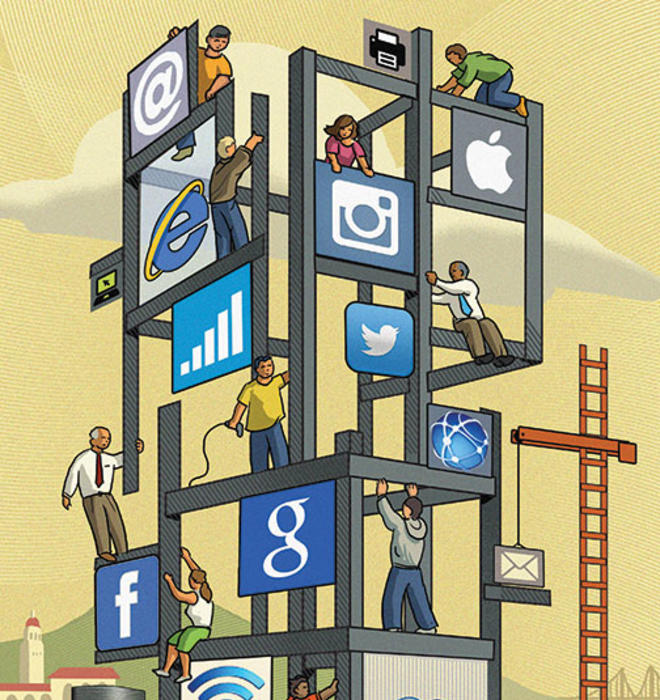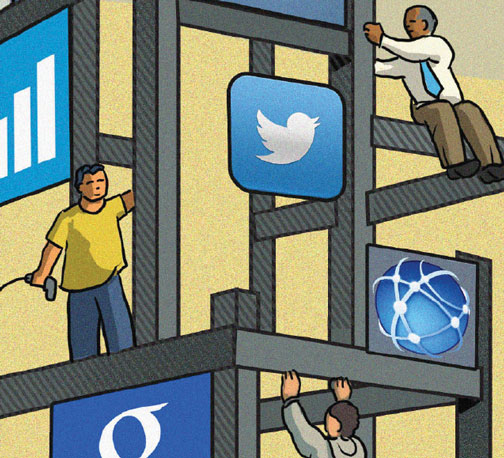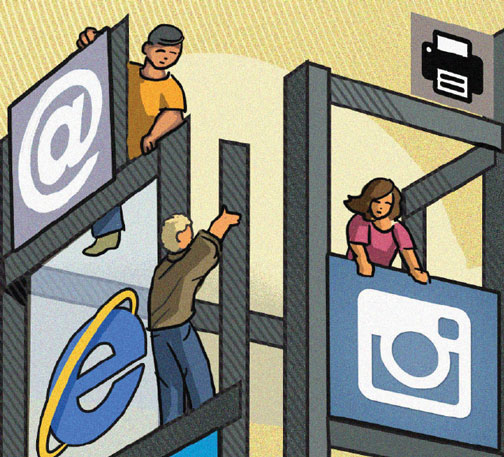
Over the Hill in Silicon Valley?
High-tech might have a youthful image, but older entrepreneurs are in the game
Minqi Jiang ’12 had an idea.
On any given day, Jiang has lots of ideas, but this one must have unnerved his parents. Fresh out of college, he had landed a dream job at Google, working as an assistant product manager. Then in January 2014, just 17 months into his new career, he quit to launch his own company.
Jiang saw that doctors prescribe medications but have no way to make sure their patients take them faithfully, resulting in wasted money and poorer health. He and a friend saw a market for an app that would remind patients to take their pills and notify their doctors that they had done so. They pitched the idea to a neighbor, an administrator for the University of California at San Francisco Medical Center, who in turn connected the young entrepreneurs with someone at the Stanford University hospital. Before Jiang knew it, his app had two clinical trials. He and his partner quit their jobs, got some seed money, and holed up in a loft apartment in the Noe Valley section of San Francisco to devote all their waking hours to getting it off the ground.
Confidence is not a problem for the slight, soft-spoken young man whose thoughts often bubble up faster than he can put them into words. He describes himself on LinkedIn as a “Thinker,” and on AngelList, the online site that matches entrepreneurs with venture capitalists, gives this motto: “What I do is simple. I continuously ask how the world can be designed better.”
Youthful hubris, unfortunately, proved no match for bureaucracy. UCSF wanted to own the intellectual property to Jiang’s software, set what Jiang thought were onerous licensing terms, and dragged out negotiations. When Stanford also got cold feet, the business stalled. Jiang’s partner returned to Google, while Jiang decided to move on to another idea.
Total time from the day he conceived his app to the day he walked away from it: five months.
Launching a business requires many things: inspiration, dedication, connections, luck, and more than a touch of foolishness. Youth rushes in where experience often fears to tread and, like Minqi Jiang, picks itself up when it falls and moves on. In their search for the Next Big Thing, the tech firms of Silicon Valley go to great lengths to project an air of youthful energy, and that is often because they are young.
Consider some statistics. In 2013, PayScale, which tracks corporate compensation, found that of 32 prominent tech companies it surveyed, only six had a median age of 35 or older; at eight companies the median age was under 30. Only shoe stores and restaurants have such a young workforce. And turnover in tech is fast: The typical Amazon or Google employee remains with the company for only about a year.
What does that mean for the environment for older workers? Age discrimination, a topic that had been simmering in blog posts and a few lawsuits (all, so far, settled out of court), emerged into the public consciousness last summer with a cover story by Noam Scheiber in The New Republic called “The Brutal Ageism of Tech.” Schieber reported that engineers and entrepreneurs in Silicon Valley as young as their mid-40s are having trouble getting hired, keeping jobs, and obtaining startup funding because they are perceived as being too slow and hidebound to succeed. Many of these men — and the fact that they are mostly men is an issue for another story — go to great lengths to combat this perceived bias, some even seeking plastic surgery.
Tech firms deny that they are biased, of course, but Silicon Valley’s icons have not helped their case. In 2007, Facebook founder Mark Zuckerberg told a tech conference: “Young people are just smarter.” Venture capitalist Vinod Khosla, whose job it is to identify breakout companies, has argued, “People under 35 are the people who make change happen. People over 45 basically die in terms of new ideas.” Folks with a few crow’s-feet around their eyes can only read those words and shiver.
Ageism in Silicon Valley is an elusive subject, though, hard to identify and even harder to prove. The world of high-tech is diverse, encompassing everything from a couple of recent grads launching a startup in their unfurnished apartment to a 76-year-old company such as Hewlett-Packard with thousands of employees. It need not even be in Silicon Valley.
But Jay Granzow ’93 — among others — thinks something is going on to make older high-tech workers fret for their jobs. A board-certified plastic surgeon and associate professor at UCLA medical school, Granzow says he has seen an increasing number of men, as young as in their late 30s, appear at his Manhattan Beach office near the growing Los Angeles tech neighborhood that has been dubbed “Silicon Beach.” Eight or nine years ago, Granzow says, it was rare to see middle-aged men come in looking for a chin tuck or chemical peel. “Now, no one bats an eye.” And Granzow’s patients are not just aging actors: “The tech guys want to seem younger, fresher.”
Age connotes many different things, observes Michael North *13, a postdoctoral research scientist at Columbia University’s Laboratory of Intergroup Relations and the Social Mind: experience as well as attention-sapping family responsibilities; wisdom as well as habits, good and bad. Certain forms of thinking do dull as we age. Psychologists distinguish between “fluid intelligence,” the mental nimbleness that characterizes youth; and “crystallized intelligence,” the perspective and institutional memory that many associate with maturity.
“There is totally ageism in Silicon Valley, and it totally makes sense economically,” says Lawrence Taymor ’70, a man possessing crystallized intelligence in abundance. Taymor, who has founded and managed several tech companies in the Bay Area after years in the entertainment industry, cites the stereotype: Younger engineers are more fluent in the latest coding languages and quicker to adapt to a new corporate culture than are older engineers. They typically command lower salaries and have fewer family commitments, so they can go out for drinks in the evening and then return to work. Traditional corporate status symbols — the large, quiet office; entry in a higher managerial layer — may be absent, replaced by messy, noisy cubicles and a flatter staffing structure.
“Programming is hard; writing code is hard,” says Taymor. “Most people in their 40s don’t write it. But it is hard to get a job in a small company if you don’t write it because they don’t need a lot of managers. They need coders.”
One hears this worldview in its distilled form from Mahboud Zabetian ’88, an engineer, entrepreneur, and “angel investor” who backs startups in their early stages of development. In his experience, older people don’t work as hard as younger ones. Many, he complains, “are now very much into the 9-to-5 mentality. On Friday around noon, it doesn’t matter where they are; these people check out and I can’t reach them until Monday. The younger folks, they’re working at 2 in the morning on a Sunday, and I can ask them a question.”
When he is trying to staff a new company, Zabetian says, “we want the energetic people who will take an idea and just live it, eat it, sleep it, dream it. That’s harder to do as you get older.”
But he also knows what it is like to sit on the other side of the table: Zebetian says he has experienced age bias when applying for consulting positions, though it frequently is masked in terms of corporate “fit.”
“I hate when I go to [a company] and they tell me, ‘You might not be right for us,’” he says. “And I go, ‘No, come on. I can be what you want, and you shouldn’t think that way.’ Then I think to myself, ‘I do the same thing when I interview people my age.’”
Ed Zschau ’86, a recruiter at a company that places executives in tech companies across Silicon Valley, believes that older workers may be looking for different things than their younger counterparts. “Right out of college, people want coolness, they look at the sexiness of the company. Later in their careers, they are more concerned about the culture of the company and people they will work with. Compensation matters a lot, but people who have been out a while think about it more analytically. It’s not just that they become more risk-averse, but what they want changes.”
Even established companies go to great lengths to project an air of hipness and youth, sometimes skirting the line of what might land them in legal trouble by, say, professing a preference for employees “who like to work and play hard.” Placement consultants advise older job applicants to avoid calling attention to their age by not wearing pleated pants or a wristwatch to job interviews.
When it is time for a startup to hire new people, most founders in any industry look first to friends or friends of their friends; in the case of tech startups, this can perpetuate what might be called a “young-boy network.” As Taymor puts it, “Two guys working out of an apartment ain’t going to hire a 50-year-old guy to join their team. But there’s no barrier to a 50-year-old guy starting his own business.”
Statistics suggest that this happens more often than the public believes. While surveys find that employees at the hot tech companies tend to be younger, focusing on them can give a misleading perception of entrepreneurship generally. In 2009, the Kauffman Foundation, which studies small-business formation, surveyed 549 companies in a number of high-growth industries, including tech, aerospace, defense, electronics, and health care, and found that Americans between the ages of 55 and 64 were doing better than they might appear in the stereotype of the startup culture. They had an entrepreneurship rate almost a third higher than among people aged 20 to 34. Company founders were 40 years old on average. Nearly 70 percent were married, and nearly 60 percent had at least one child.
Dan Levin ’86, the chief operating officer at the cloud-computing company Box, says the ageism “problem” may really be one of perspective. Once a company takes off, the next round of staffing often involves bringing in people with experience — “grown-ups,” as they are sometimes called — who know how to manage a maturing business, obtain funding, and get things done. There may be no better example than Google Executive Chairman Eric Schmidt ’76, recruited by the company’s then-20-something founders when he was 46.
Psychological research, explains Michael North, suggests that older entrepreneurs “would be better at certain key skills — especially some of those that pertain to business success, like dealing with other people and having a larger professional network.” He cites Steve Jobs, who developed the iPhone when he was in his early 50s and had the insight to depart from conventional wisdom and the clout to overcome obstacles in a way that a younger entrepreneur might not. “For entrepreneurship in particular,” North writes, “diversity and depth of experience actually appear to be the best predictors of innovation, not age.”
The stereotype of the risk-taking young entrepreneur may be overstated. In January, The Wall Street Journal reported that a smaller percentage of under-30-year-olds now own their own businesses — including tech businesses — than at any time in the last quarter-century. The paper quoted business experts who reported that many young people are held back by, of all things, a fear of failure.
Taymor points out that, while entertainment and social-media products get the attention, the biggest and fastest-growing tech sectors are education and health care — “eds and meds,” in industry parlance — and here, older entrepreneurs may have an edge because these are fields where connections and experience are more important.
Jotham Stein ’84, a lawyer who practices employment law in Palo Alto and Illinois, believes that entrepreneurs who have founded successful companies sometimes can get startup funding because they are older. Investors will continue to back people with a track record of making money, much in the way that Hollywood studios will keep producing sequels to a high-grossing movie. “It takes a few bad companies before they stop giving you funding,” Stein says. “But that’s a lifetime.”
Venture capitalist Paul Graham told The New York Times in 2013 that when approached by entrepreneurs older than 32, many investors “start to be a little skeptical.” Why? Susan Fiske, Princeton’s Eugene Higgins Professor of Psychology, who has written extensively about ageism, replies, “Only the most die-hard economist insists that discrimination doesn’t exist because it is inefficient.”
Still, funding a company developing new products for a fickle public is a very risky activity. Most new businesses fail in any field, but in the tech industry at least, those that pay off can pay off big. With examples of hyper-successes such as Facebook and Google in mind — both founded by 20-somethings — many investors prefer to swing for the fences.
Eight months after he gave up on his medications app, Minqi Jiang already is deep into his next ventures. He moved across the bay to Berkeley, where the rents are cheaper, and works out of an apartment he shares with Peter Zakin ’12. They first developed a small file-sharing app — “to help us get our groove down as a team” — and now are working on an app that would enable users to make travel arrangements on their phones.
Would he hire older engineers? “If they can dedicate themselves to the schedule of a startup, we’d welcome them with open arms,” he answers. “But in the early stages, the schedule can be very intense. We’re trying to make something that doesn’t exist, exist. Older people might not take to that. They’d want that separation between their work and family life. It’s hard to see someone leaving Google for this.”
Reminded that he himself did just that, Jiang pauses for a moment and tries to put his decision in perspective.
“I figured it was a good time in my life,” he explains, “because in five years I’ll probably have a family or something.”
Mark F. Bernstein ’83 is PAW’s senior writer.
Ditch the Furniture, Line Up the Laptops
In Silicon Valley, Failure is Just Part of the Learning Process








No responses yet